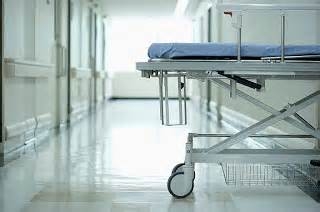
States have already committed money to preventive health programs the federal government had agreed to help fund, but has now scrapped in the budget.
States have been left to figure out whether to try to make up the shortfall themselves or scrap the programs, while hospitals are warning cuts in the budget will lead to longer waits in the emergency room and for elective surgery in the short-term, and a delay in building wards and buying new medical equipment in the long-term.
The budget revealed the national partnerships agreement on preventive health (NPAPH) with states and territories, due to expire in 2017, would be scrapped to save the commonwealth $367.9m. Funding guarantees from 2011 were also axed, reducing the money flowing to hospitals by $1.8bn over four years.
New South Wales and Queensland have confirmed they had already funded preventive health programs with the money guaranteed by the commonwealth through the NPAPH. NSW health minister Jillian Skinner said the state had allocated money to the healthy children initiative and healthy workers initiative.
“Preventive health has been one of the key priorities of the NSW Liberal and Nationals government, a point illustrated by the fact that I appointed a special ministerial advisory committee on preventive health and established the office of preventive health in south-western Sydney,” she said in a statement to Guardian Australia.
“It is a shame NSW will no longer receive commonwealth funding under the national partnership agreement on preventive health but we remain absolutely committed to programs such as the healthy children initiative and healthy workers initiative and will find the funds to continue these programs.”
Queensland has yet to receive $50m of the $100m it was allocated until 2018 to reduce prevalence of obesity, smoking and harmful alcohol consumption.
“Changing behaviour is complex and takes time. This was recognised in the development of the NPAPH, which was expected to be implemented over seven years to support Australians to embed substantial lifestyle changes which would improve their health and reduce the risk of chronic disease,” a Queensland Health spokesperson said.
In Queensland, $17.8m has been committed from the NPAPH, which includes $14.9m in contracts with 17 external organisations from the non-government sector, private companies, universities, health and hospital services, and other government departments. In addition, there is an internal allocation of $2.8m within the department of health for frontline services such as Quitline and infrastructure to support workplace wellbeing initiatives.
A spokesman for Queensland’s health minister, Lawrence Springborg, said he was considering the ramifications of the NPAPH being axed and how to approach the funding arrangements.
The chief executive of Australian Healthcare and Hospitals Association (AHHA), Alison Verhoeven, said the states would struggle to run their hospitals in the short- and long-term with the reduction in funding outlined in the budget.
“There’s going to be immediate impacts on the ability of states to keep their commitment to retain elective surgery targets and emergency waiting room targets,” she said.
Verhoeven said patients could expect longer waiting times in emergency as the $7 GP co-payment pushed more people into hospitals.
“The other issue of long-term impacts is that from 2016-17 there are issues about the growth of funding,” she said.
“This means an inability of states and territories to invest in hospital infrastructure. It’s very, very difficult to do long-term investments.”
Verhoeven said long-term investments included planning hospital wards and investing in updating medical equipment.
“These aren’t things you buy off the shelf, it requires planning,” she said.
Verhoeven said much of the funding depended on the outcome of a review into federal and state funding, and the AHHA would work with the states to get “creative” with their funding issues.
“The pressure is now on the states and territories to raise the GST to deal with the funding shortfall,” she said.
“I wouldn’t proffer that as a solution, I’m not a taxation expert, but I would say the states are being pushed into a corner to look at that.”
Verhoeven said the commonwealth had effectively “vacated the space” when it came to hospital funding.
Source: The Gaurdian
